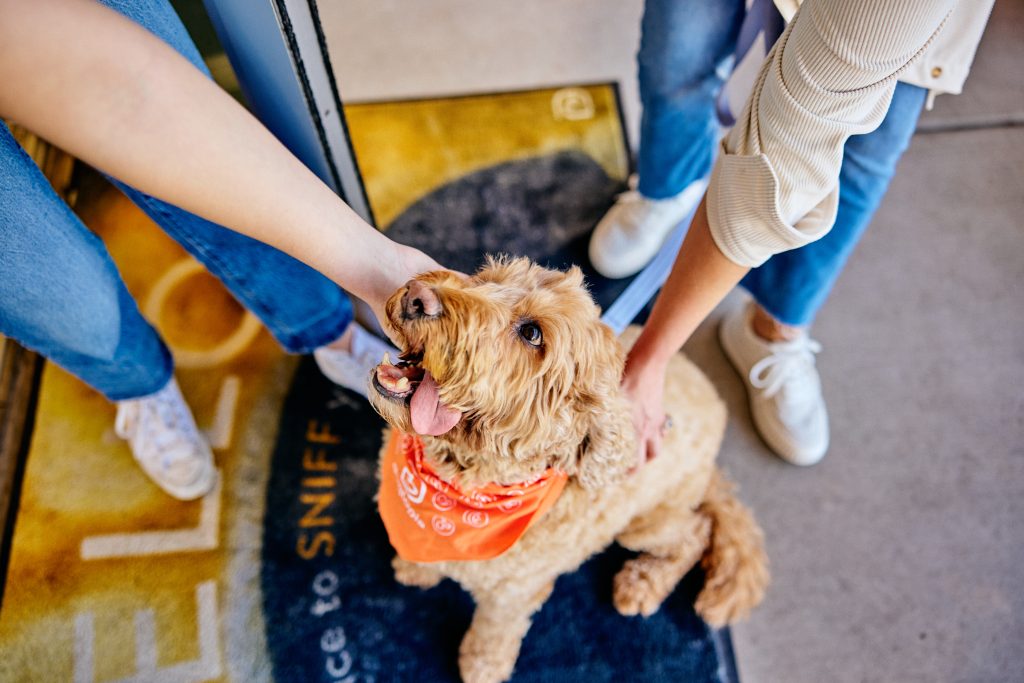The Importance of Puppy Socialization for Healthy Behavior

The Importance of Early Puppy Socialization
Introducing your puppy to the world is one of the most rewarding responsibilities of pet ownership. Puppy socialization is not just a key phase in a puppy’s early life; it significantly influences their long-term behavior, emotional health, and adaptability as an adult dog. This process plays a critical role in ensuring they grow into well-adjusted pets who can thrive in various environments.
Understanding why socialization is so paramount opens the door to better training outcomes and healthier relationships with pets. Here are a few key reasons:
- Prevents Behavioral Issues: A well-socialized puppy is significantly less likely to develop fears, anxiety, or aggression. For instance, dogs that have been exposed to different breeds, environments, and experiences during their formative weeks often react calmly to new situations, making them less prone to behavioral problems.
- Encourages Confidence: Early exposure to varied people, pets, and environments is crucial for building a puppy’s confidence. A confident dog is easier to train and more enjoyable to live with, as they are typically less reactive and more eager to explore their surroundings.
- Develops Social Skills: Through interaction with other dogs, puppies learn essential social cues and norms of canine behavior. This understanding fosters a sense of belonging and community among dogs, leading to harmonious interactions and reduced stress for both the pets and their owners.
Experts recommend starting socialization during the critical window of 3 to 14 weeks of age. This period is often referred to as the “sensitive period” because puppies are particularly receptive to new experiences during this time. Activities such as visiting parks, pet stores, or inviting friends over can instill positive associations with different sights, sounds, and smells.
To effectively enhance your puppy’s socialization journey, consider incorporating specific activities into their routine:
- Playdates: Regular play sessions with well-behaved dogs allow puppies to learn important social cues while having fun. This informal learning helps reinforce behaviors that will serve them well throughout their lives.
- Group Training Classes: Enrolling in structured training classes not only fosters obedience but also provides an excellent setting for puppies to interact with peers. These environments offer invaluable lessons in focus, control, and mutual respect among dogs.
- Public Outings: Taking your puppy on walks in busier settings, such as shopping districts or community events, exposes them to various stimuli including sounds, people, and different types of animals. This exposure can ease their fear of unfamiliar situations as they grow.
Prioritizing socialization from a young age lays the groundwork for a happy and healthy dog. The myriad benefits—ranging from improved behavior to enhanced adaptability—can profoundly alter a puppy’s life trajectory, leading to the development of a beloved family companion. By investing time and effort in this critical period, you are not only nurturing a pet but fostering a lifelong bond that enriches both your lives.

DISCOVER MORE: Click here to learn about positive training techniques
Building the Foundation for Future Interactions
Socialization during a puppy’s early life sets the stage for how they will engage with the world around them. The effects of poor socialization can be detrimental, leading to a myriad of issues in adulthood, including fear-based aggression, anxiety disorders, and general behavioral problems. Recognizing the pivotal nature of this formative phase creates an opportunity for new pet owners to foster robust, balanced, and healthy behaviors.
One of the primary concerns for dog owners is the potential for behavioral issues that stem from inadequate social exposure. A study highlighted by the American Veterinary Society of Animal Behavior emphasizes that puppies who receive less than appropriate socialization during the critical period of 3 to 14 weeks are at a higher risk of developing fears and phobias later in life. For example, a puppy that hasn’t encountered diverse environments and various species may react fearfully or aggressively when faced with the unexpected, such as a bus, skateboard, or even a different breed of dog.
Moreover, the benefits of early socialization go beyond prevention. A well-socialized puppy is typically more confident, which in turn leads to a more relaxed home environment. Confident dogs are less likely to exhibit undesirable behaviors like excessive barking or chewing, making family life far more enjoyable. Experts in canine behavior suggest a variety of activities to enrich a puppy’s social experience:
- Exposure to Various Sounds: Introducing your puppy to different sounds, like vacuum cleaners, children playing, or traffic noises, helps them become desensitized to common household sounds. This practice can mitigate potential anxiety later on.
- Meeting Different People: Allowing your puppy to meet individuals of all ages, sizes, and appearances fosters positive associations and helps them learn to trust others. Encourage positive interactions with calm and friendly individuals to further enhance this experience.
- Outdoor Adventures: Taking your puppy on excursions to parks, beaches, or hiking trails exposes them to nature while creating opportunities for new experiences such as different terrains, smells, and wildlife.
Puppy socialization not only enriches a dog’s life; it can deepen the bond between pet and owner. A well-adjusted dog is much easier to manage, leading to a more united family dynamic. When dogs feel secure in their surroundings and enjoy positive interactions with others, owners are less likely to encounter problems that could strain the relationship.
Investing time and effort in these early socialization activities makes a significant difference in how dogs navigate their adult lives. By actively engaging in these enrichment opportunities, owners can help pave the way for a happy and adaptable pet. The path to responsible dog ownership starts here, creating lifelong companions equipped to handle life’s unpredictable moments with poise and grace.
| Advantage | Description |
|---|---|
| Improved Social Skills | Puppies that are socialized with other animals and people are more likely to become friendly and confident adults, reducing fear-based behaviors. |
| Enhanced Adaptability | Socialized puppies learn to cope with new environments, noises, and experiences, making them less anxious and more adaptable to changes in their surroundings. |
Socialization is a critical aspect of raising a well-adjusted puppy. By exposing them to various situations, such as meeting new people, encountering different dogs, and experiencing various stimuli, owners can foster a well-rounded temperament. This proactive approach can significantly mitigate behavioral issues later in life. For example, dogs that encounter various settings during their critical development period are less likely to exhibit signs of aggression or fear.Additionally, the practice of socialization during the early months of a puppy’s life lays the groundwork for robust mental wellness. Puppies that experience diverse social interactions can develop crucial coping mechanisms, helping them navigate the complexities of the canine world. This is pivotal in creating a harmonious relationship not just between the puppy and its owner, but also among peers.To delve deeper into the universe of puppy behavior, consider exploring more advanced techniques of socialization and specific scenarios that pet owners can replicate to enhance their puppy’s experience. By investing time and training in socialization, the journey from a playful puppy to a loyal companion becomes a rewarding and fulfilling one.
DISCOVER MORE: Click here to learn about holistic nutrition for your pets
Enhancing Skills Through Social Interaction
When it comes to puppy socialization, the focus extends beyond merely familiarizing pets with new sights and sounds. Engaging in social interactions plays a critical role in honing crucial life skills for dogs. Skills like impulse control, communication, and learning from peer behaviors significantly shape a well-adjusted companion. During the socialization period, puppies interact with their littermates and other dogs, where they learn vital lessons about play etiquette. This includes understanding when to yield space, recognizing dominant behaviors, and interpreting body language effectively. These skills are integral not only for peer interactions but also for their relationships with humans.
Positive experiences during the early stages are invaluable in shaping a puppy’s ability to navigate different situations with ease. For instance, introducing puppies to puppy training classes can be greatly beneficial. According to the APDT (Association of Professional Dog Trainers), structured classes provide controlled environments where puppies can interact socially with their peers while also learning basic commands. This combination of socialization and training amplifies their potential to adapt to various contexts seamlessly.
Moreover, encountering diverse social settings reduces the likelihood of developing negative behavioral traits as they mature. A puppy exposed to children playing or crowds at a local festival learns to approach varying dynamics with confidence rather than fear. A lack of exposure, on the other hand, can lead to overreactions to everyday situations. Studies reveal that dogs who have routinely practiced engagement in diverse environments show lower levels of reactivity and stress, ultimately leading to a healthier, more balanced demeanor.
In addition to fundamental training classes, owners can consider arranging playdates with other well-socialized dogs. These interactions can reinforce positive behaviors while allowing dogs to learn from one another. Just as humans benefit from social interaction in developing emotional intelligence, so do canines strengthen their social intelligence through canine companionship.
Puppy socialization should also address potential negative encounters preemptively. Introducing a puppy to more challenging situations, such as meeting a leery dog or enduring sudden loud noises, encourages them to remain composed under stress. Adapting to these scenarios, when executed with care and respect towards the puppy’s well-being, can significantly contribute to resilience. This resilience allows them to cope with unexpected events later in life, including vet visits or travel.
Furthermore, the impact of puppy socialization extends to public perception of a breed or individual dog. A well-socialized dog is less likely to exhibit aggression or anxiety, helping to alter common stereotypes that often tarnish specific breeds. Thus, responsible socialization can play a crucial role in bettering the overall reputation of dogs in communities, paving the way for further acceptance and understanding between the public and canines.
As we invest time in building relationships through playful and positive exposures during a puppy’s formative months, we cultivate adaptable and well-adjusted companions ready to embrace life’s challenges. The symbiotic relationship between socialization and every aspect of canine behavior cannot be overstated—this investment is not just about a single puppy, but about enhancing the bond between pets and their humans for years to come.
DISCOVER: Click here to learn more about positive training techniques
Conclusion: Building a Foundation for Lifelong Well-Being
The journey of puppy socialization is a vital and transformative process that lays the groundwork for a dog’s future behavior and interactions. By exposing puppies to various environments, people, and other animals, owners create a solid foundation for healthy behavioral patterns that will last throughout their lives. This early engagement fosters essential skills such as communication, impulse control, and adaptability, which not only enhance a dog’s ability to navigate the world confidently but also contribute to a more harmonious relationship with their human companions.
Furthermore, a well-socialized puppy is more equipped to manage stressors, reducing the incidence of anxiety or aggression later on. By intentionally introducing them to diverse situations and training programs, we not only promote resilience but also challenge common misconceptions about dog behavior. The benefits of puppy socialization extend beyond individual pets; they help reshape public perception of breeds, fostering a culture of acceptance and understanding within communities.
Ultimately, investing in thorough puppy socialization is not merely a matter of compliance with training guidelines; it is a commitment to raising a balanced, happy, and healthy canine companion. Owners are encouraged to seek resources, such as local training classes or dog parks, to facilitate these enriching experiences. In the end, every moment spent nurturing a puppy’s social skills contributes to a lifetime of fulfilling interactions and companionship, making it an essential aspect of responsible pet ownership.



